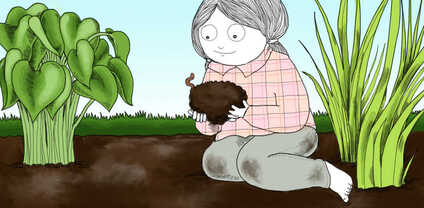|
One of the sad realities of poetry is that virtually every poem misses more readers than it hits. Even famous poems, like "The Raven" or "Nothing Gold Can Stay," impress only a fraction of the readers who encounter them. When it comes to poems posted online, or poems published in journals, the odds of engaging the average reader are steep. Most readers don't finish poems, and even when they do read them all the way to the last line (without skipping), there's usually a point of disengagement before the last line falls. They may technically read all the way to the end, but their thoughts are on who did or didn't text back, or how the cat's doing, as they're reading. Way back in the candle-lit nineteenth century, Mr. Poe insisted that the longest any poem could be and still hold a reader's attention was 100 lines. That was a century before the Internet and social media. These days, many readers jump right from the title to the last line. This seems cruel to poets, and in some ways, it is a cruel reality, but it simply reflects the fact that, for most people, thirty-seconds of attention is a lot. Even from someone who's blood-related to you, or personally mentioned in your poem. A part of every reader is waiting for your poem to fail. It's a form of confirmation bias, which means the default assumption is: if you were any good, you'd already be famous. Since you're not, you must be bad. Then if anything is off in the poem, it confirms this initial idea. And by "anything" I mean grammar errors, typos, cliches, weak images, dull language, or glitchy rhythm and meter. The instant a reader (or editor) spots something "off" in your poem, they're going to scroll away, swipe away, or flip the page. They won't feel cheated, because poems are almost always free, but they'll stand confident in the idea that your work is average or below average and all they'll likely remember is the part that failed. AI can't (yet) help you with this issue. People don't read AI's poems, either. So what can you do? Two things. The first is to accept the reality of confirmation bias. The second is to eliminate all obvious errors in your poems. This means putting more time into each poem. It means setting new poems aside for a while and editing and polishing them after you've had a chance to get some distance. There's simply no other way. To be honest, this is very good news. There seems to be something in human nature that shrugs off the notion of "toss away" poetry, or disposable poems. I'm not saying that all poems should, be weighty or profound, but I think it's a very good thing that some part of us still expects something special each time we read a new poem. There's no shame in wanting artistry from an artist! So, the way to stop the scroll is to stop your own scroll and spend more time on each of your poems to be sure you don't provide convenient escape routes for readers. If you'd like some feedback for your poetry or a bit of help polishing your words, just click one of the buttons below. Or email @ [email protected] Categories All
0 Comments
The most important thing in business is branding. The same goes for celebrities. But what many writers don't realize is: it's also true for poems, stories, and novels. It's obvious if I mention someone like Stephen King or J.K. Rowling, but it's just as true for Lord Byron and Jericho Brown.
When it comes to iconic writers in any genre, you get a picture and a feeling just from the sound of their name. You can also spot a piece of their work in an instant. This is what it takes to really get over the top as any kind of artist. You need to create an immediate association between your name, image, and a particular niche, archetype, or signature style. For most artists this means some degree of self-restraint and submission to audience capture. Mick Jagger at 80 years old just released a new Rolling Stones song and guess what, it sounds like the Rolling Stones sounded in the 1970's because that's what people expect and desire. The Stones and Jagger could play anything at this point, and have done so. Go listen to Super Heavy. But no-one liked Super Heavy, not as much as they liked the Stones, anyway. So how do you do this? And if you're already doing it, how do you do it better? The good new is, there are answers to those questions. The bad news is, they're not a simple answers. If it was easy, we'd have even more celebrities running around than we already do! I'm going to give you the answers over the course of the next few blog posts. So stay tuned. The place to start even if you've already published or posted and have fans and followers is: always do good work. Think of your work as food you're offering to people. If it's burned or bland, why give it to them. They're not starving. The only reason to offer your work is if you feel it's delicious, or deliciously bitter! So, the first step in any brand is: consistent quality. Don't hurry to get your work out; focus on making it taste good. And serving it in the right place at the right time with the right atmosphere. I'll dig in deeper on how to find out what your brand is and how to push it to the front of your creative efforts in my next post! Meanwhile, if you find these blog posts useful, please consider supporting the site. Your contribution is invaluable in allowing me to offer the content. PayPal [email protected] Pick up my 7 Secrets of Poetry guide to help write and polish your poems on your own, for a mere $5.00 right now through the following special link: https://www.buymeacoffee.com/writerdanq/extras And if you'd like some expert help with editing or polishing your poems or you just want a bit of feedback, hit the links below. Sylvia Plath is probably most well known for dying. That's no small trick in a universe where, so far as we know, everyone and everything eventually dies. If you can manage to die in a way people remember over a half-century later, that's certainly some kind of an accomplishment. In Plath's case, poetic fame and death are so closely wedded that it's a test to all of us, from literary critics, to casual readers to see if we're willing to follow her, not into death, but into the depth and richness of life that poetry celebrates and, in some cases, reveals. We can get so caught up in her death, that we forget her artistry. But this artistry is the true essence of Plath as a person. That's what many people fail to see. As it is the true essence of any worthwhile poet, and that's what I'll be digging into in the upcoming series of blog-posts on her work. I want to show you not only why she's one of the most important artists of the twentieth century, but how she was able to give voice to the poems we all know and love. Along the way you may find new elements in her work, and you may also find great inspiration for your own work and life. Monday held profound significance for Plath, and I'll point out that Monday is "moon day" and, also, that Plath died on Monday, February 11th, 1963. Her last poem "Edge" features the moon prominently, and the last four lines she ever wrote are intently focused on the moon. So, we'll kick things off on Monday by taking a look at "Sonnet to Satan," written when Plath was a student at Smith college. This early poem brims with inventiveness, daring, and rebellion. It also stands as a convenient model to spotlight some of Plath's "tricks" and techniques that created a foundation for her poetic genius. Be ready to meet the devil on Monday, but don't sweat it because even Satan himself envies and admires this incredible poet! No "tally" today because I've been working on music. Please have a listen to my latest song, "Freedom (Le Chime)" which is a ballad with a poetic video. At least I hope it's poetic, you tell me! If you prefer something you can dance to, check out my song "Funk the Princess"-- it's a lot of fun. Categories All My recent post on "Bitter Enders" received a nice response. Thanks to everyone who read the post and replied to me about it. Your comments and ideas are deeply appreciated! It's a privilege and a pleasure to share thoughts with each and every one of you!
Never be shy about reaching out to me to talk poetry! Just my email or contact me through Facebook. One of the most powerful insights on the topic of emotional well-being came from poet Cindy Creel, who wasn't actually responding to my blog post, but to a poem I posted. She wrote: "describing the way something made you feel is a place of strength." Words to live by! This is another way of saying: poems heal. Reading a poem, writing a poem, dreaming a poem. In each and every case, poems provide inspiration and -- often -- hope. People have written poems in concentration camps, mental wards, country jails, deserts, and on rafts lost as sea. It's natural to go through bouts of bitterness, alienation, doubt, and envy in your life as poet, but don't let these emotions define you or your experience with art. Poems, offered by anyone, at any time, are acts of love. Or should be. Even when poets write with deep anger and bitterness like Rimbaud or Plath's -- poetry, at its most destructive -- remains an act of creation. Poets grow things like ideas, moods, spirits, themes and, sometimes, myths. Cindy also notes the deep relationship between physical well-being and emotional well-being, starting right from the earth up. You need to literally get your hands dirty. Soil contains minerals that are essential to your mental and physical well-being. I overlooked these priceless insights in my original post. So let's state it clearly now: You need to eat right, you need to get outside, and you need to put your hands in the dirt. So hike, bike, garden, jog, or just sit on a blanket under the stars. Take a sip of puddle water off your fingertips, touch a spiderweb, eat a blade of grass. Rub some dirt on your face. Suck a pebble. Inhale the reviving scent of the earth. Keep yourself, healthy, sane, and inspired so you can joyfully share your creative works with all of us for many years to come! Tally Poems Written: 313 Submissions: 51 Rejections: 21 (13 tiered) Acceptances: 0 Poem written today: "n/a" Mixing song "Global Rain" If you need a hand revising and polishing: 1) Have me do it for you! Click the "Poem Polisher" button below. I've helped lots of poets. 2) Use my 7 Secrets of Poetry pdf as a guide for revision. Nowadays almost everyone has fans of some kind. It may be Twitter or Facebook followers, TikTok or Instagram likes, but whatever the platform or content, we all seem to have our share of followers and fans.
Notice I didn't say our "fair" share of followers and fans. The reason for this is because nothing about fame or having fans is fair. That is, there's no logical correlation between quality of content and number of fans, I think we all know that. I'm not saying there's no connection; I'm saying it's complicated and ambiguous. Fame is also fleeting. Fans are very fickle. If you change your hairstyle or gain or lose a few pounds, expect seismic tremors to shake your fan base. If you go "dark" to catch your breath, many will find someone new to follow. Say something -- just one something -- that offends enough people and you'll be cancelled. So, how should we deal with the bright lights of fame -- or even the phone-screen gleam of niche fame? Luckily for us, a great answer was recently offered by the poet Michael Dwayne Smith. I crossed paths with Michael at Facebook and during a great exchange about poetry submissions and readers, Michael observed that for poets, "close attention" is much more important than "massive eyeballs." I think this is brilliant. It should be the focal point of every poet's dance with fame. What you're looking for are people who love and need your poems. Not just eyeballs. Sure, it's nice to get likes and shares, and if you want high numbers, you should try to get them, but never let chasing them weigh you down. Never let the lack of Big Fame keep you from fully experiencing the joy your art has brought to the world through your small fame. As a poet, you're a performer and it's part of your job to inspire people. Even if you write dark and sad, you want people to feel your work, not just hear about it. So remember Michael's words and value "close attention" and not just "massive" attention. Tally Poems Written: 313 Submissions: 51 Rejections: 21 (13 tiered) Acceptances: 0 Poem written today: "First Days at Half Moon Bay" If you need a hand revising and polishing: 1) Have me do it for you! Click the "Poem Polisher" button below. I've helped lots of poets. 2) Use my 7 Secrets of Poetry pdf as a guide for revision. |





